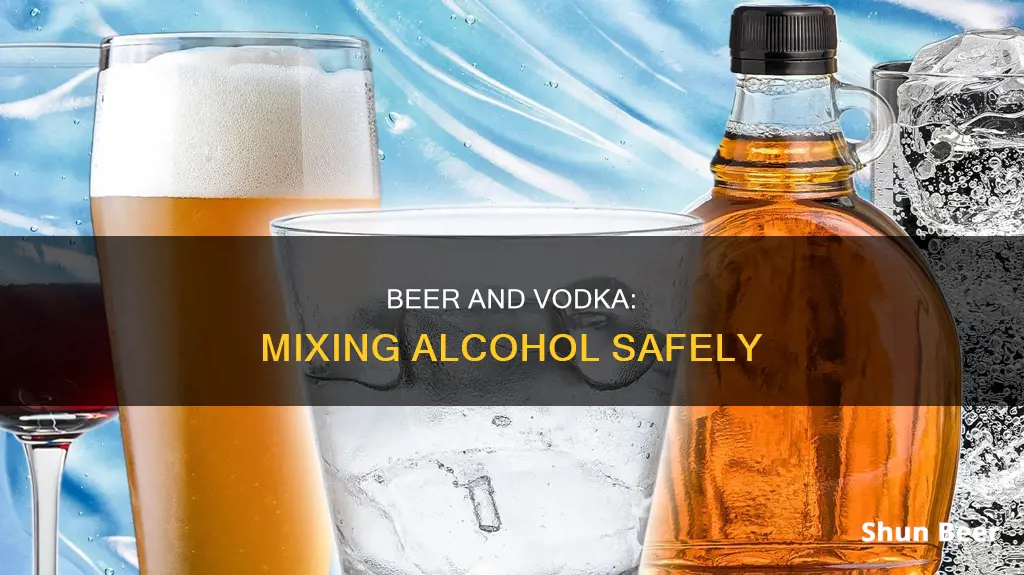
The popular saying, beer before liquor, never been sicker; liquor before beer, you're in the clear, suggests that drinking beer after vodka can cause more severe hangovers. However, modern research has debunked this myth, concluding that the order of consumption does not influence a hangover's severity. The amount of alcohol consumed has a more significant impact on hangover symptoms than the type of alcohol or the order in which it is consumed. To reduce the risk and severity of a hangover, it is advisable to drink in moderation, stay hydrated, and get sufficient sleep.
| Characteristics | Values |
|---|---|
| Drinking beer after vodka | It is safe to drink beer after vodka. |
| Drinking beer before liquor | It will not make you sicker. |
| Drinking liquor before beer | It will not keep you clear of a hangover. |
| Hangover cause | It is caused by high blood alcohol levels, drinking on an empty stomach, how frequently you drink, genetics, congeners, and smoking. |
| Hangover prevention | Drink in moderation, stay hydrated, get enough sleep, and avoid rounds. |
What You'll Learn

Drinking order: beer before liquor, never sicker
The saying, "Beer before liquor, never been sicker; liquor before beer, you're in the clear," is a popular phrase with unknown origins. It refers to the idea that drinking alcoholic beverages in a specific order will help you avoid a hangover.
There are a few theories about how this saying came about. One is that most people start their evenings with drinks that have a lower alcohol content, such as beer and wine, and move on to liquor as the night goes on. So, if they get sick at the end of the night or feel terrible the next morning, they might blame it on the order in which they drank their drinks.
Another theory is based on the idea that liquor has a higher alcohol content than beer and is therefore more likely to spike your blood alcohol levels in a short period of time. So, finishing the night with liquor after drinking beer throughout the evening can quickly push your already elevated blood alcohol content over the edge, contributing to a hangover.
Despite these theories, the order in which you consume your drinks is unlikely to influence whether you experience a hangover the next day. That's because alcohol is absorbed into your bloodstream as soon as it reaches your stomach. So, all the alcohol you drank the night before will have been absorbed long before your hangover sets in.
As long as the total amount of alcohol you consume remains the same, drinking liquor before beer is no more effective at preventing a hangover than drinking beer before liquor. However, if a particular drinking order consistently causes you to consume larger amounts of alcohol than another, it may be more likely to cause a hangover.
Other factors that can affect your risk of experiencing a hangover include the amount of alcohol you drink, whether you ate before drinking, how frequently you drink, genetics, congeners (compounds found naturally in alcoholic beverages), and whether you smoke.
While the order of drinking beer and liquor may not impact the severity of a hangover, it's important to remember that consuming too much alcohol can have negative health effects.
Root Beer Guzzling: How Much A&W is Too Much?
You may want to see also

Carbonation: beer's bubbles speed up alcohol absorption
Whether you're drinking beer after vodka or vodka after beer, the order in which you consume your drinks is unlikely to influence whether you experience a hangover the next day. That said, carbonation in alcoholic drinks can speed up the rate at which alcohol is absorbed into your bloodstream.
Carbonation is simply carbon dioxide gas added to a beverage. The concept has been around since the 17th century when Europeans believed that adding bubbles to their diet had therapeutic value. It wasn't until much later that scientists discovered that carbonation may speed up the movement of liquids from the stomach to the small intestine, where alcohol is absorbed into the bloodstream.
The way our bodies handle bubbles has a lot to do with digestion. One theory suggests that carbonation creates pressure in the stomach, which in turn accelerates gastric emptying, allowing alcohol to move to the small intestine more quickly. There's a muscular valve at the bottom of the stomach called the pyloric sphincter that opens to allow food and drink to pass through to the small intestine. So, there's reason to believe that carbonation and bloating might cause this valve to open prematurely, letting alcohol into the small intestine faster than it would without bubbles.
Some studies show that carbonation in drinks like champagne speeds up the rate of alcohol absorption anywhere from 40-50%. However, most of the studies that have looked into this idea are limited. For example, in 2003, a group of British researchers tested carbonated champagne against champagne that had been degassed with an electric blender. Among six test subjects, they found that those who drank the bubbly champagne had a higher blood alcohol content (BAC) after the first 20 minutes of drinking. Roughly 40 minutes later, both groups had equal BACs.
In another study, conducted in 2006, researchers in Manchester, England, tested how fast alcohol was absorbed in 21 volunteers. This experiment was conducted using vodka served three ways: neat, mixed with still water, and mixed with sparkling water. They found that 14 out of 21 subjects absorbed alcohol with the carbonated mixer at a faster rate, with seven subjects showing either no change or a decrease in the absorption rate.
Beer and Paracetamol: Safe Mix or Not?
You may want to see also

Blood alcohol levels: liquor spikes levels, worsening hangovers
Drinking beer after vodka may not be the best idea if you want to avoid a hangover the next day. There is a popular saying that goes, "Beer before liquor, never been sicker; liquor before beer, you're in the clear." This suggests that drinking beer after vodka may worsen a hangover.
The saying is based on the idea that liquor has a higher alcohol content than beer, and consuming it can quickly spike your blood alcohol levels. So, if you've been drinking beer for a few hours and then switch to liquor, your already elevated blood alcohol content can be pushed over the edge, contributing to a hangover. On the other hand, starting with liquor and ending with beer may slow the spikes in blood alcohol levels, potentially reducing the severity of a hangover.
However, it's important to note that the order of drinks is unlikely to be the sole determinant of a hangover. The total amount of alcohol consumed, regardless of the type of drink, is a more significant factor. Additionally, other factors such as drinking on an empty stomach, frequency of drinking, genetics, congeners in the drink, and smoking can also influence the risk and severity of a hangover.
To reduce the likelihood and severity of a hangover, it's recommended to drink in moderation, avoid drinking on an empty stomach, limit the amount and frequency of alcohol consumption, and avoid smoking. Ultimately, the best way to avoid a hangover is to abstain from drinking alcohol altogether.
Beer in Baking: The Secret to Perfect Crusts and Doughs
You may want to see also

Congeners: dark spirits have more, worsening hangovers
The popular saying, "beer before liquor, never been sicker; liquor before beer, you're in the clear," suggests that drinking beer after vodka or any liquor will worsen a hangover. However, this is just a myth, and the order of drinks does not affect the severity of a hangover. The amount of alcohol consumed is the main factor influencing how bad a hangover will be.
That being said, congeners, which are compounds found naturally in alcoholic beverages, can contribute to worsening hangovers. Dark spirits, such as whiskey, brandy, and red wine, tend to have higher levels of congeners due to the fermentation process. These compounds can increase the toxicity of a hangover, leading to more unpleasant symptoms.
Congeners are produced during the fermentation process and are influenced by the type of grains or fruits used in distillation. They include substances such as esters, tannins, and acetaldehyde, which can have negative effects on the body, particularly when consumed in large quantities. While congeners are present in all alcoholic drinks, dark-coloured liquors tend to have higher concentrations, which may explain why some people experience worse hangovers after consuming these beverages.
It's important to note that while congeners are a factor, the overall amount of alcohol consumed is still the primary determinant of hangover severity. Drinking in moderation, staying hydrated, and getting enough sleep are the best ways to prevent and reduce hangover symptoms.
Beer Sleeves: Do They Keep Drinks Cool?
You may want to see also

Drinking pace: liquor lowers inhibitions, increasing consumption
Drinking beer after vodka will not make you sicker than drinking them in the opposite order. However, drinking liquor before beer may increase your drinking pace.
Liquor has a higher alcohol content than beer, so drinking it first can quickly spike your blood alcohol content. Beer, which has a lower alcohol content, is often drunk in larger quantities and over a longer period. So, if you start with liquor and then move on to drinking beer, you may find yourself drinking beer faster than usual.
Alcohol increases the release of dopamine, the "feel-good" chemical in your brain. The more alcohol you consume, the more dopamine is released. This can make it difficult for your brain to differentiate between good and bad decisions. As a result, you may find yourself drinking faster than usual or drinking more than you normally would.
Additionally, alcohol impairs your inhibitory control, which is your ability to inhibit a motor response that has already been initiated. This means that once you start drinking, you may find it harder to stop or slow down.
It's important to note that the total amount of alcohol consumed is a more significant factor in experiencing a hangover than the order in which you drink. However, if a particular drinking order consistently leads to consuming larger amounts of alcohol, it may increase the likelihood of a hangover.
Drinking Beer on Daytona Beach: What's Allowed?
You may want to see also
Frequently asked questions
Yes, you can drink beer after vodka. The order of drinks does not matter.
The saying refers to the idea that drinking liquor after beer can worsen a hangover. However, this is a myth.
No, the order of drinks does not affect hangover severity. The amount of alcohol consumed is a more significant factor.
To prevent a hangover, it is important to stay hydrated, drink in moderation, and get enough sleep.
Mixing beer and liquor does not inherently make you more drunk. The level of intoxication depends on the total amount of alcohol consumed.







